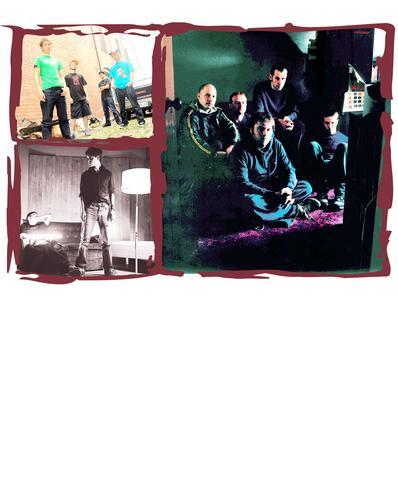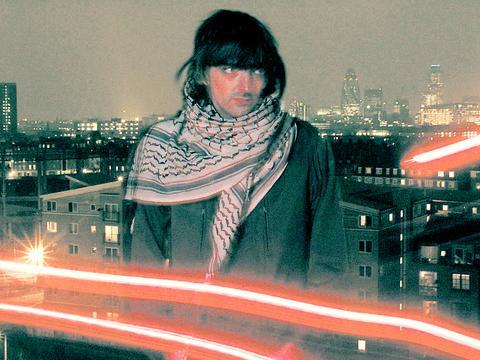It used to be there was a season for festivals -- summer -- and they came fast and furious, with Spring Scream, then Ho-Hai-Yan and finally Formoz, after which the organizers would go home and hopefully count their money and fans would return to indoor venues to get their music fix. No more.
To hear Doris Yeh (葉湘怡) of the Taiwan Rock Alliance (TRA) tell it, she took a look at the calendar and noticed that, hey, nothing ever happens in the fall. "So we thought, why not put on a show then."

PHOTO COURTESY OF ARTISTS
"We" refers to Yeh and her partner Freddy Lin (

PHOTO COURTESY OF FANATIC PROMOTION
The choice of venues is refreshing for its discovery of Taiwan's other dominant natural resource for this type of event, namely the mountains. And unlike the summer's festivals with their enormous stages, corporate sponsors and all the other fittings of bloated music concerts, Autumn Tiger will be relatively low-key -- sort of like an after-party for Taiwan's indie music scene.
That's not to say the lineup was an afterthought, though. A distilled batch of Taiwan's most popular indie bands is set to play. Scottish post-rock gods Mogwai will make an appearance, along with England's Capitol K, Tribeca from Sweden and the G.B.H.-meets-Jesus Lizard punk band FC Five from Japan.
For those who may scratch their heads at the reappearance of Mogwai in Taipei less than a year after playing The Wall last November and who have noted a rash of second and third comings by foreign bands, ie. Dirty Three, FC Five and Cat Power, there's an explanation in that all these groups initiated the contact. "It's not because we don't know any other bands," Yeh said.
No one will complain anyway about another chance to catch Mogwai live tomorrow night, and this time in the unusual setting of Wulai Elementary School's playground. Their music is more commonly associated with dark, smoky clubs, but its epic scale and intense volume should play interestingly in the lush river valley.
The newcomers to Taiwan -- Tribeca and Capitol K -- show some interesting variety for their synth pop and rock-electronica fusion. Most importantly, they sound like nothing being made in Taiwan.
Tribeca is an updated version of the Pet Shop Boys or pre-Violator Depeche Mode, with the residual influences of 1990s indie rock. It's either fabulously ironic or cringe-inducing, depending on one's judgment of 1980s post-disco synth music. Either way it's undeniably melodic and the lyrics of teen angst and furtive sexual experiences raise suspicions that front-man Lasse Lindh is telling stories from his adolescent years.
Taking things into uncharted musical territory is Capitol K, whose two albums contain every imaginable type of music re-engineered in the most improbable ways. It's the kind of experimentation that goes awry in less able hands or that comes out establishing new genres. Capitol K is in the latter category.
Filling up the rest of the lineup over the two days on two stages will be local favorites like Tizzy Bac, WonFu (旺福), Nipples and LTK. Taipei's best shoe-gazer band Sugarplum Fairy (甜梅號) will even make a reunion appearance. Keeping things going on Saturday night will be DJ@llen, DJ K and Lim Giong (林強) in case people don't feel like leaving after the bands finish. And who would? Camping will be allowed at the venue.
Kristian Craig Robinson, who plays music under the name Capitol K, has released three albums that earned him a spot at the forefront of England's independent music scene. Taipei Times caught up with Robinson at home to figure out where the ideas behind the music come from.
Taipei Times: You were born in Malta, and grew up in Brunei. Isn't that an unusual upbringing?
Kristian Craig Robinson: Yeah. Malta's this tiny island out in the middle of the Mediterranean where people go for holidays. I don't remember much from those days because I left when I was two. But I have a lot of family there still, so I go back quite often. It's really small, though. I mean like nine miles (14km) by five (8km), so it's a bit claustrophobic.
After living in Malta we moved to Brunei in like the late 1970s, early 1980s, and left when they got their independence ... I remember all the crazy parades and gold-plated Rolls Royces. It was kind of like Disneyland with phenomenal wealth.
TT: Did life in those places stick with you in later years?
Robinson: In a musical sense it influenced me for sure. It's more soundscapey, with some Eastern melodies and sampling. I went back to Asia and did a lot of location recording for the second album (Happy Happy). The recent stuff is more a result of being in London for seven years.
But maybe because I grew up in a culture that is Islamic, Malay and Chinese, I have a more global point of view than my neighbors here [in London].
TT: How do the dynamics differ when you work solo and in a band?
Robinson: I started out doing studio projects, and pretty much play live on my own most of the time. I did that for several years, sort of doing all the stuff, and wanted to get back into the live thing with a full band lately with the second album. But in Taipei I'll be playing solo and that's how I've been playing for some time now.
TT: Do you find working in band constricts your space for experimentation or does a band bring out more experimentation in you?
Robinson: I'd say it's equal in both parts. Playing in band you realize you need a lot of backing. We have a live drum kit, electronic drums, three laptops and all that. It's a lot to get sounding right, but when it happens right, when we merge electronics and live sound it's wonderful. Playing alone live it's much more electronic.
TT: What will you bring to Taipei?
Robinson: I'll be coming with a mixer, two laptops, a theramin, a couple of dictaphones, a guitar, effects pedals. I've got stuff on my computer all sequenced and ready. I've got tapes here from Brunei, Malaysia, festivals, one from Cologne, Morocco.
TT: What will you play in Taipei?
Robinson: I'll play stuff from both albums and I've been finishing an album here and might bring some of that with me.
TT: Should people stare at their feet or move their feet for your show?
Robinson: I don't really mind. The worst thing that can happen is when people talk. That's really disconcerting.
Capitol K will play tomorrow night at 10:20pm.

Towering high above Taiwan’s capital city at 508 meters, Taipei 101 dominates the skyline. The earthquake-proof skyscraper of steel and glass has captured the imagination of professional rock climber Alex Honnold for more than a decade. Tomorrow morning, he will climb it in his signature free solo style — without ropes or protective equipment. And Netflix will broadcast it — live. The event’s announcement has drawn both excitement and trepidation, as well as some concerns over the ethical implications of attempting such a high-risk endeavor on live broadcast. Many have questioned Honnold’s desire to continues his free-solo climbs now that he’s a

As Taiwan’s second most populous city, Taichung looms large in the electoral map. Taiwanese political commentators describe it — along with neighboring Changhua County — as Taiwan’s “swing states” (搖擺州), which is a curious direct borrowing from American election terminology. In the early post-Martial Law era, Taichung was referred to as a “desert of democracy” because while the Democratic Progressive Party (DPP) was winning elections in the north and south, Taichung remained staunchly loyal to the Chinese Nationalist Party (KMT). That changed over time, but in both Changhua and Taichung, the DPP still suffers from a “one-term curse,” with the

Jan. 26 to Feb. 1 Nearly 90 years after it was last recorded, the Basay language was taught in a classroom for the first time in September last year. Over the following three months, students learned its sounds along with the customs and folktales of the Ketagalan people, who once spoke it across northern Taiwan. Although each Ketagalan settlement had its own language, Basay functioned as a common trade language. By the late 19th century, it had largely fallen out of daily use as speakers shifted to Hoklo (commonly known as Taiwanese), surviving only in fragments remembered by the elderly. In

William Liu (劉家君) moved to Kaohsiung from Nantou to live with his boyfriend Reg Hong (洪嘉佑). “In Nantou, people do not support gay rights at all and never even talk about it. Living here made me optimistic and made me realize how much I can express myself,” Liu tells the Taipei Times. Hong and his friend Cony Hsieh (謝昀希) are both active in several LGBT groups and organizations in Kaohsiung. They were among the people behind the city’s 16th Pride event in November last year, which gathered over 35,000 people. Along with others, they clearly see Kaohsiung as the nexus of LGBT rights.